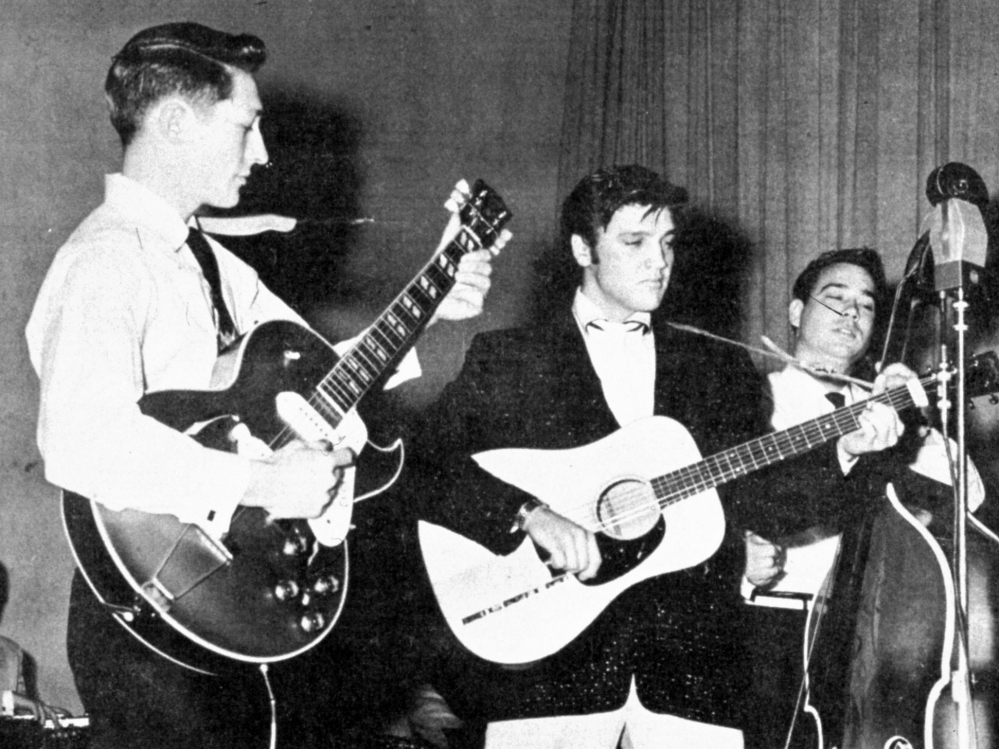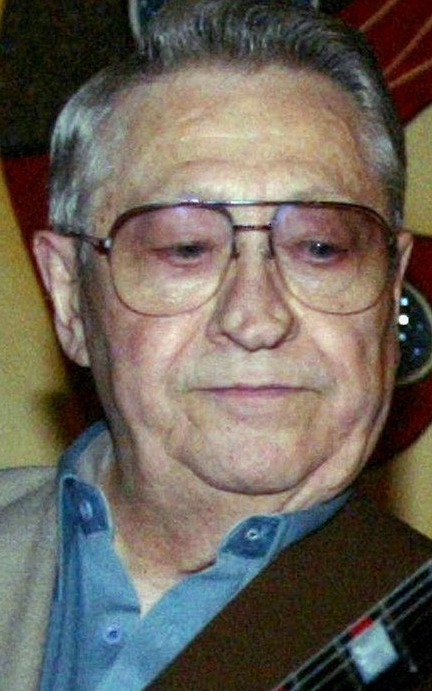MEMPHIS, Tenn. — Scotty Moore, the pioneering rock guitarist whose sharp, graceful style helped Elvis Presley shape his revolutionary sound and inspired a generation of musicians that included Keith Richards, Jimmy Page and Bruce Springsteen, died Tuesday. He was 84.
Moore died at his home in Nashville, said biographer and friend James L. Dickerson.
“As a musician, I consider him one of the co-founders of rock ‘n’ roll because of the guitar licks that he invented,” Dickerson said, calling Moore an icon.
Presley’s ex-wife Priscilla Presley echoed that sentiment in a statement Tuesday night: “Elvis loved Scotty dearly and treasured those amazing years together, both in the studio and on the road. Scotty was an amazing musician and a legend in his own right. The incredible music that Scotty and Elvis made together will live forever and influence generations to come.”
MEMBER OF ROCK HALL
Moore, a member of the Rock and Roll Hall of Fame, was the last survivor of a combo that included Presley, bassist Bill Black and producer Sam Phillips.
Moore was a local session musician when he and Black were thrown together with Presley on July 5, 1954, in the Memphis-based Sun Records studios. Presley was a self-effacing, but determined teen anxious to make a record. Moore’s bright riffs and fluid solos – natural compliments to Presley’s strumming rhythm guitar – and Black’s hard-slapping work on a standup bass gave Elvis the foundation on which he developed a fresh blend of blues, gospel and country that came to be called rock ‘n’ roll.
“One day, we went to have coffee with Sam and his secretary, Marion Keisker, and she was the one who brought up Elvis,” Moore said in a 2014 interview with Guitar Player magazine. “We didn’t know, but Marion had a crush on Elvis, and she asked Sam if he had ever talked to that boy who had been in there.
“Sam said to Marion, ‘Go back in there and get that boy’s telephone number, and give it to Scotty.’ Then, Sam turned to me and said, ‘Why don’t you listen to this boy, and see what you think.’ Marion came back with a slip of paper, and it said ‘Elvis Presley.’ I said, ‘Elvis Presley – what the hell kind of a name is that?’ ”
TENSION WITH ‘COLONEL’ PARKER
For the now-legendary Sun sessions they covered a wide range of songs, from “That’s All Right” to “Mystery Train.” After “That’s All Right” began drawing attention, Presley, Moore and Black took to the road playing any gig they could find, large or small, adding drummer D.J. Fontana and trying their best to be heard over thousands of screaming fans.
The hip-shaking Presley soon rose from regional act to superstardom, signing up with RCA Records and topping the charts with “Heartbreak Hotel,” “All Shook Up” and many other hits. Elvis was the star, but young musicians listened closely to Moore’s contributions, whether the slow, churning solo he laid down on “Heartbreak Hotel” or the flashy lead on “Hard-Headed Woman.”
“Everyone else wanted to be Elvis,” Richards observed. “I wanted to be Scotty.”
Moore, Black and Fontana backed Presley for his shocking TV appearances and early movies, but by 1957 had tired of what Moore called “Elvis economics.” In the memoir “That’s Alright, Elvis,” published in 1997, Moore noted that he earned just over $8,000 in 1956, while Presley became a millionaire. Moore also cited tension with Elvis’ manager, “Colonel” Tom Parker.
“We couldn’t go talk to Elvis and talk about anything,” Moore, who along with Black left Presley’s group, said in 1997. “There wasn’t ever any privacy. It was designed that way, but not by Elvis. It’s not that I feel bitterness, just disappointment.”
Copy the Story LinkSend questions/comments to the editors.




Success. Please wait for the page to reload. If the page does not reload within 5 seconds, please refresh the page.
Enter your email and password to access comments.
Hi, to comment on stories you must . This profile is in addition to your subscription and website login.
Already have a commenting profile? .
Invalid username/password.
Please check your email to confirm and complete your registration.
Only subscribers are eligible to post comments. Please subscribe or login first for digital access. Here’s why.
Use the form below to reset your password. When you've submitted your account email, we will send an email with a reset code.